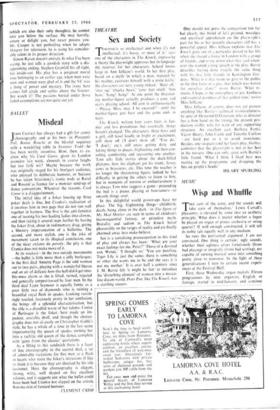THEA 7'RE
Sex and Society
"TEACHING'S so intellectual and when it's not I intellectual, it's bossy, or most of it.' says one of the characters in The Knack, expressing a theory the playwright approves but in language she reserves for her characters. School looms large in Ann Jellicoe's world. In her first play. based on a myth 'in which a man, rejected by his mother, castrates himself with a stone knife,' the characters are very young indeed: 'Buzz off.' 'shut up.' 'cheeky beast,' your feet smell," 'bim barn.' 'bang! bang!' At one point the threaten- ing mother-figure actually produces a cane and starts playing school. All join in enthusiastically --Please. Miss. may I be excusedr---until the mother-figure gets hurt and the game ends in tears.
The Knack, written four years later. is fun- nier and less pretentious but essentially things haven't changed. The characters, three boys and a girl, still howl loudly in fright or excitement. still show off ('I don't show off.' You do.' `I don't,' etc.), still enjoy getting dirty and taking. things to pieces, frightening and then con- soling; comforting and reassuring one another. Tom tells little stories about the duck-billed platypus, how the elephant got his trunk. Jersey cows in brassieres, etc. This time the teacher is no longer the threatening figure, indeed he has difficulty in getting the others to listen to him, but in moments of tension or embarrassment it is always Tom who suggests a game—pretending the bed is a piano, playing at lion-tamers—to smooth things over.
In this delightful world grown-ups have no place. The big, frightening things—childbirth, death, being alone in the dark—in The Sport of My Mad Mother are seen in terms of children's inconsequential fantasy, or primitive myth. Brutality and sadism in The Knack hover pleasurably on the verges of reality and are finally charmed away into make-believe.
Sex is a tantalising preoccupation in this kind of play and always has been: 'What are your exact feelings for me, Peter?' Those of a devoted son. Wendy.' I thought so.' You are puzzling. Tiger Lily is just the same; there is something or other she wants me to be and she says it is not my mother.' It is over half a century since J. M. Barrie felt 'it might be fun' to introduce the 'disturbing element' of woman into a mascu- line dream-world. Peter Pan, like The Knack, was a startling success. One should not press the comparison to far but clearly this blend of let's pretend, nostalgia and uncritical approbation on the playwright's part for his or her juvenile character, still has a powerful appeal. Miss Jellicoe explains that The Knack grew out of a particular period in her life when she shared a house in London %%ith a group of friends. and wrote down what the■ said when- ever she wanted a long speech in the play. Barrie describes having done exactly the same thing with his five little friends in Kensington Gar- dens. 'What is it that made us give to the public in the thin form of a play that which was woven for ourselves alone!' wrote Barrie. 'What re- mains. I hope, is the atmosphere of joy, kindness and essential goodness of that golden time,' writes Miss Jellicoe.
Miss Jellicoe. of course, does not yet possess anything like Barrie's technical resourcefulness. In spite of Desmond O'Donovan, who as director has a firm hand on the timing. the present pro- duction visibly wilts for want of any supporting structure. An excellent cast- Barbara Ferris, Victor Henry. John Castle and Timothy Carlton —are hard put to it to avoid monotony. Besides. one suspects land her latest play. Shelley. confirms) that the pla■ k% right is not at her best in the nursery. One can only agree with Barrie's little friend. 'What I think I liked best was tearing up the programme and dropping the bits on people's heads.'
HILARY SPURLING


































 Previous page
Previous page